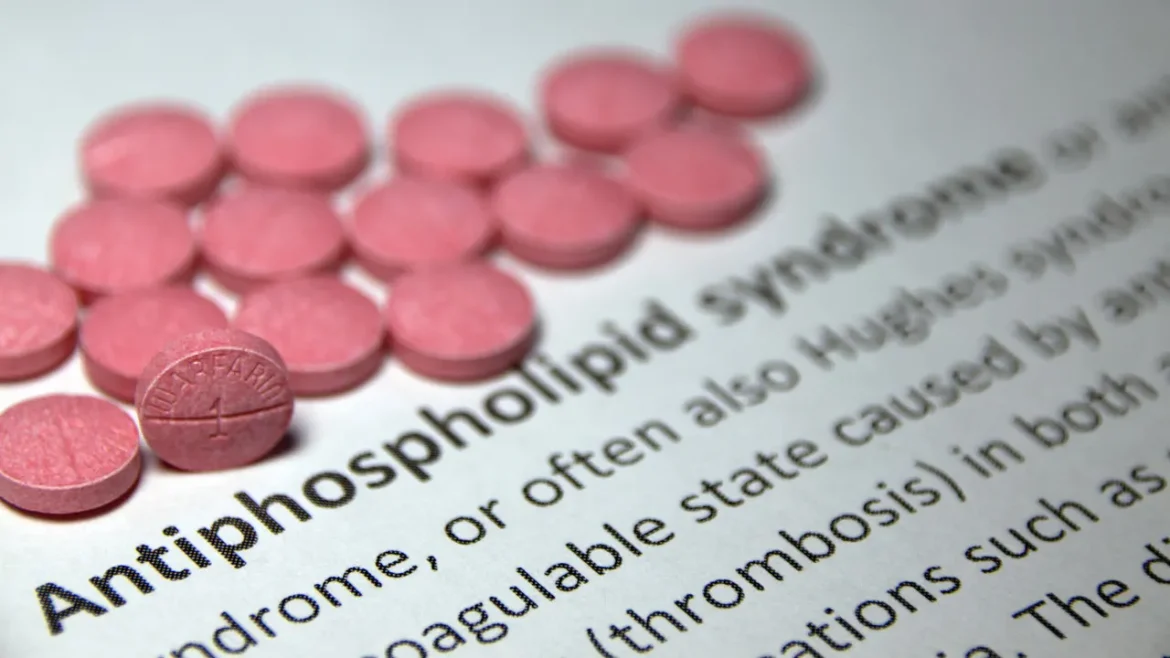Description
Antiphospholipid syndrome (APS), a kind of systemic autoimmune disease, is defined by the development of aPLs against phospholipids. These antibodies have been linked to a greater probability of thrombosis, recurrent miscarriages, and other pregnancy issues because they target proteins connected to cell membranes, such as phospholipids. APS may occur either independently of other autoimmune illnesses or in conjunction with them. A broad variety of clinical symptoms are brought on by APS, which mainly impacts the vascular system. The characteristic of APS is thrombosis, which can happen within the venous and even the arterial systems.
While peripheral vascular disease, stroke, or myocardial infarction may result from pulmonary embolism, arterial thrombosis, or deep vein thrombosis (DVT), these are typical indications of venous thrombosis. Preterm birth, hypertension, restricted intrauterine growth, and repeated pregnancy losses are also linked to APS.
You May Also Like:
IS DR MERCOLA KRILL OIL TRULY A GREAT SOURCE OF DAILY OMEGA-3S?
Antiphospholipid syndrome (APS) | catastrophic antiphospholipid syndrome (CAPS) / Asherson’s syndrome: Description, Causes, And Treatment Protocol is an original (HealthXWire) article.
Possible Causes
Antiphospholipid Syndrome (APS) has a specific cause that is not fully known. The formation of APS, nevertheless, may be influenced by a number of circumstances.
Genetic Factors
An APS genetic predisposition has been proven by evidence. An individual may be more susceptible to getting APS if they have specific genetic variants. To fully comprehend the individual genes and their involvement in the emergence of the illness, more investigation is necessary.
Autoimmunity
As an autoimmune disorder, APS is one in which the body’s immune system unintentionally targets and destroys normal cells and tissues. Antiphospholipid antibodies, which are wrongly produced by the immune system in APS, target specific proteins linked to phospholipids, which are crucial elements of cell membranes along with blood clotting mechanisms.
Medications
The emergence of drug-induced APS has been connected to some drugs. Numerous antibiotics, anti-seizure drugs like phenytoin, and drugs for the heart like procainamide have all been linked to this illness. Contrary to primary APS, drug-induced APS does not appear to be as common.
Infections
In rare instances, infections can lead to the onset of APS or aggravate current APS symptoms. Certain bacteria or viruses, like the human immunodeficiency virus (HIV), the hepatitis C virus (HCV), and the Epstein-Barr virus (EBV), have been linked to an increased risk of APS. Antiphospholipid antibodies are thought to be produced as a result of the infection stimulating the immune system.
Exacerbating and Mitigating Factors
A higher possibility of pregnancy difficulties and blood clots can result from the autoimmune illness known as antiphospholipid syndrome (APS), which can be defined by an accumulation of antiphospholipid antibodies. The symptoms of APS can be made worse or better by a number of factors, including the following: –
Exacerbating Factors
Hormonal Changes
Hormonal changes might affect the frequency and extent of APS-related issues, including those that happen during pregnancy, postpartum times, or while using hormonal contraceptives. The chance of blood clots in APS patients may be raised by estrogen-containing drugs, involving hormone replacement therapy.
Inflammatory Triggers
For people with APS, infections, particularly infections caused by viruses and bacteria, can set off inflammatory reactions that raise the possibility of blood clot development. Additionally, inflammation might make preexisting symptoms worse.
Medications
Several drugs, such as hormone therapy, oral contraceptives, and a variety of immunomodulatory ones, have the potential to exacerbate the prothrombotic state in APS. Healthcare providers must balance the benefits and drawbacks of these medications while treating individuals suffering from APS.
Surgery and Trauma
Surgery and physical trauma may disrupt the usual coagulation balance and raise the risk of developing clots in people with APS. Before surgery or other invasive treatments, healthcare professionals should be informed about an individual’s APS diagnosis.
Mitigating Factors
Regular Monitoring
Healthcare professionals can assess the efficacy of treatment and alter medication dosages as necessary by routinely monitoring antiphospholipid antibody concentrations and coagulation parameters like prothrombin time (PT), international normalized ratio (INR), and activated partial thromboplastin time (aPTT).
Lifestyle Modifications
A normal weight, regular exercise, quitting smoking, and a balanced diet containing low saturated fats all have the potential to reduce the probability of blood clot development and enhance the general condition of the heart.
Education and Support
People with APS can be empowered to actively engage in their healthcare and make decisions by being informed about their situation, its potential complications, the significance of adhering to therapy and routine monitoring, and even more.
Anticoagulant Medications
Anticoagulant drugs, including low-dosage aspirin, and even anticoagulant injections like warfarin or heparin, are the main treatments for APS. These drugs lower the likelihood of thrombotic incidents and the development of blood clots in people with APS.
Pregnancy Management
Pregnant or trying to get pregnant women with APS need strict supervision and specific management to avoid problems. Prophylactic anticoagulation may be used in both pregnancy and after childbirth.

Standard Treatment Protocol
The goal of APS therapy is to lessen the risk of problems, stop thrombotic events, and enhance pregnancy outcomes. The following are the main components of standard therapy procedures.
Anticoagulation Therapy
The cornerstone of APS therapy is anticoagulation. The objective is to avoid developing blood clots and lower the possibility of thrombotic events. The patient’s unique traits and the existence of extra risk factors influence the anticoagulant of preference. The following alternatives are frequently employed.
Novel oral anticoagulants (NOACs)
NOACs, including dabigatran, rivaroxaban, and apixaban, have demonstrated promising outcomes in the management of APS. They provide simple dosages without the requirement for constant observation. However, in some circumstances, like pregnancy or kidney failure, their usage may be restricted.
Vitamin K antagonists (i.e., warfarin)
Usually used for long-lasting anticoagulation, warfarin prevents the synthesis of clotting factors. For the purpose of ensuring that the appropriate therapeutic range is reached, the international normalized ratio (INR) must be regularly monitored.
Heparin
High-risk circumstances like pregnancy or sudden thrombotic events may call for the usage of unfractionated or low molecular weight heparin (LMWH) heparin. LMWH has been chosen because of its good safety record and simplicity of usage.
Low-dose aspirin
Aspirin contains antiplatelet properties and is frequently used in conjunction with anticoagulant therapy. Patients having APS who have previous experiences of arterial thrombosis benefit the most from it.
Additional Measures
The following actions are suggested in addition to anticoagulant therapy to properly control APS.
Monitoring and Prevention
To identify and manage cardiovascular risk factors, it is essential to routinely evaluate blood sugar, blood pressure, and cholesterol levels. Compression stockings must be worn during extended periods of inactivity as one method for deep vein thrombosis prevention.
Lifestyle Modifications
The possibility of thrombotic events can be significantly decreased by living a healthy lifestyle. This involves eating a nutritious diet, quitting smoking, frequent exercise, and moderate alcohol use.


Treatment Options
Numerous adjunct therapies and supplementary methods have been investigated in APS management in addition to standard care. Although their effectiveness has not yet been conclusively shown, some patients may benefit from them in addition to traditional therapy. The following are some examples of typical treatment protocols: –
Immunomodulatory Therapies
Rituximab
Individuals with refractory APS are occasionally considered for treatment with rituximab, an antibody with a monoclonal structure that targets B cells. It may aid in reducing the generation of aPL antibodies.
Hydroxychloroquine
This drug has demonstrated potential advantages for lowering disease activity and decreasing thrombotic events associated with APS. It possesses immunomodulatory effects and could aid in reducing the immunological reaction that causes APS.
Nutritional Supplements
Antioxidants
Some anti-oxidants, like N-acetylcysteine and vitamin E, have demonstrated promise in lowering oxidative stress and enhancing endothelial function. They need to be studied more closely, nevertheless, in terms of APS management.
Vitamin D
A deficient level of vitamin D is believed to be associated with an elevated possibility of cardiovascular disease. Although ideal dosage needs and long-term consequences in APS are still unknown, supplementation may be advantageous.
Omega-3 Fatty Acids
Fish oil contains omega-3 fatty acids, which are anti-inflammatory and may help lower the possibility of thrombosis. However, there is little evidence supporting their usage in APS, and more studies are required to prove their effectiveness.
Natural and Herbal Remedies
Turmeric
The primary compound in turmeric, curcumin, has anti-inflammatory effects. The role it plays in APS needs to be further researched, despite the fact that it has demonstrated promising benefits in a number of inflammatory disorders.
Ginkgo Biloba
Laboratory tests have shown that ginkgo biloba possesses anticoagulant and anti-inflammatory properties. As a result of prospective interactions with anticoagulant drugs, its usage in APS has not been thoroughly investigated, so caution must be used.
However, it is significant to remember that a healthcare practitioner should be consulted before using adjunct therapies. These procedures could be viewed as complementary methods to improve the management of APS but ought not to be employed in place of regular anticoagulant medication. To get the best results, treatment strategies must be tailored to each patient’s clinical profile and therapeutic reaction.


Conclusion
Antiphospholipid syndrome constitutes a multifaceted autoimmune disorder that, if not appropriately handled, can result in significant health complications. While conventional remedies, such as anticoagulants and antiplatelet medications, aid in symptom control, natural approaches encompassing alterations in lifestyle, physical activity, and a nutritious diet can also prove beneficial. Nevertheless, individuals afflicted with APS should seek guidance from a medical expert before embarking on any drastic lifestyle modifications.
Moreover, self-diagnosis and self-treatment can be dangerous, given the capricious nature and varying intensity of APS manifestations. Through meticulous management and under careful medical supervision, those suffering from APS can lead healthy, fulfilling lives, notwithstanding the challenges posed by the syndrome.


Additional resources for further reference
https://www.ncbi.nlm.nih.gov/books/NBK430980/
https://www.versusarthritis.org/about-arthritis/conditions/antiphospholipid-syndrome/
https://rheumatology.org/patients/antiphospholipid-syndrome
Important Note: The information contained in this article is for general informational purposes only, and should not be construed as health or medical advice, nor is it intended to diagnose, prevent, treat, or cure any disease or health condition. Before embarking on any diet, fitness regimen, or program of nutritional supplementation, it is advisable to consult your healthcare professional in order to determine its safety and probable efficacy in terms of your individual state of health.
Regarding Nutritional Supplements Or Other Non-Prescription Health Products: If any nutritional supplements or other non-prescription health products are mentioned in the foregoing article, any claims or statements made about them have not been evaluated by the U.S. Food and Drug Administration, and such nutritional supplements or other health products are not intended to diagnose, treat, cure, or prevent any disease.
Table of Contents


